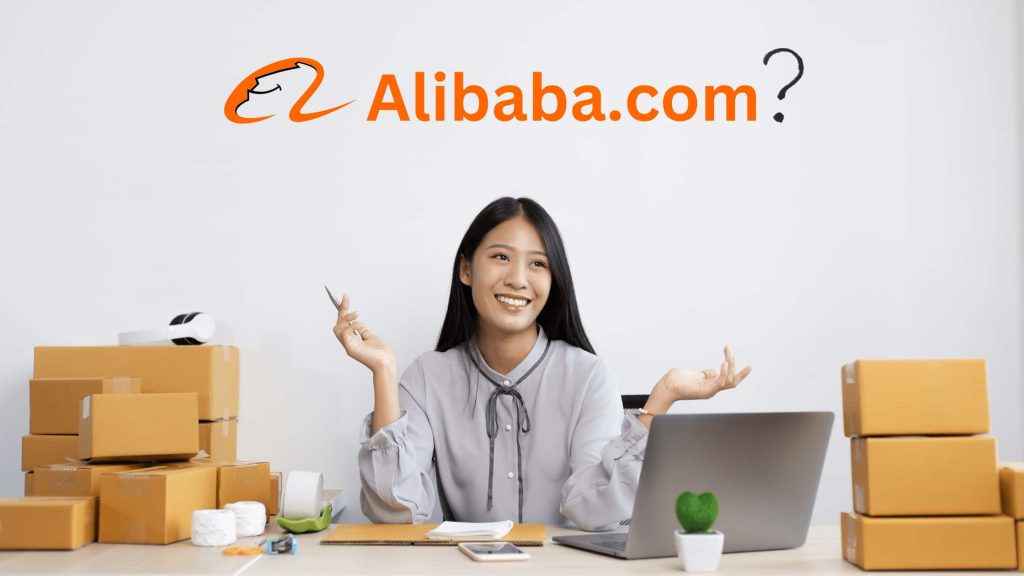If you’re wondering how to sell on Amazon from Alibaba, you’re on the right track. Alibaba is favored for its low-cost goods and bulk buying options, perfect for Amazon sellers.
Knowing Alibaba’s safety features, like Trade Assurance, is key. They help you buy with confidence from verified suppliers.
Our guide will show you how to navigate the step-by-step process of selling on Amazon from Alibaba, ensuring a seamless sourcing experience. Let’s get started on this profitable e-commerce pairing.
Understanding How to Sell on Amazon from Alibaba
When embarking on the journey of selling on Amazon using products sourced from Alibaba, it’s essential to clearly grasp what Alibaba and Amazon FBA are and how they operate within the e-commerce space.
What Is Alibaba?

Alibaba.com is an expansive online marketplace in China that connects international buyers with manufacturers and wholesalers. It is renowned for offering a wide variety of products at relatively lower prices due to the cost-effective manufacturing processes in China.
Why is Alibaba so cheap?
- Bulk Manufacturing: Economies of scale in China allow for cheaper production costs.
- Direct Access: Purchasers buy directly from manufacturers, avoiding middlemen costs.
Types of products Alibaba is good for:
- Consumer electronics
- Apparel
- Home and garden items
Is Alibaba legit?
- Alibaba is a legitimate platform equipped with several mechanisms to protect buyers, such as Trade Assurance and supplier badges.
Alibaba payment methods:
- Trade Assurance
- Letter of credit
- Secure Payment service
- PayPal
- Bank transfer
What Is Amazon FBA?
Amazon FBA (Fulfillment by Amazon) is a service that allows sellers to store their products in Amazon’s fulfillment centers. Amazon then takes care of product storage, packaging, and shipping to customers. This makes it an attractive option for sellers because it streamlines the online selling process, especially for international product sourcing.
Sourcing and FBA:
- When you source products from Alibaba, Amazon FBA can manage the entire logistics and customer service chain post-purchase.
- The FBA program also handles returns and exchanges, which can simplify international selling concerns.
Product Sourcing:
- It’s essential to source high-quality products that comply with Amazon’s policies.
- Ensure that the products you select from Alibaba have a healthy demand on Amazon and offer a good profit margin.
Related reads:
Setting Up Your Alibaba and Amazon Accounts

The initial step is establishing accounts on both platforms to start selling on Amazon via Alibaba sourcing. These accounts will serve as the foundation of your e-commerce business, ensuring a secure transaction environment and an organized approach to managing your listings and supplier interactions.
Creating an Alibaba Account
- Go to Alibaba’s website and click ‘Join Free’ to begin registration.
- Fill out the required details, ensuring the information provided is accurate and up-to-date to avoid any complications.
- Verify your account via email or phone, as Alibaba requires to enhance security and activate your account.
Setting Up Amazon Seller Central
- Navigate to the Amazon Services page and select the ‘Start Selling’ option to create an Amazon seller account.
- Choose between an Individual or Professional seller account based on the volume of sales you expect and the features you need.
- Individual Account: Suitable for sellers who plan to sell fewer than 40 items per month.
- Professional Account: Designed for higher volume sales with access to advanced selling tools.
- Provide business details, including legal name, address, and tax information.
- Set up payment methods for receiving earnings from your Amazon sales. Amazon requires your bank account information and accepts various forms of payment.
By setting up accounts on both Alibaba and Amazon Seller Central, you’ll be well on your way to sourcing products from Alibaba and listing them on Amazon, creating opportunities for growth and success in the e-commerce marketplace.
Finding the Right Products to Sell

Selecting the right products to sell on Amazon and efficiently conducting thorough product research on Alibaba is crucial for your success in the e-commerce marketplace.
Product Research on Alibaba
When conducting product research on Alibaba, it’s essential to target items that align with both your business strengths and market demand. Here’s how you should proceed:
- Defining Your Niche: Consider categories that fit your business model and have an understanding of the niche market.
- Search Functionality: Utilize Alibaba’s search bar to discover a wide variety of products that cater to your chosen niche.
- Filter Options: Apply filters to narrow down choices, focusing on the suppliers with high ratings and positive reviews.
- Best Sellers: Browse through Alibaba’s “best selling” sections to gauge what products are currently popular.
Don’t miss out on our insightful podcast episode that dives into the art of choosing a profitable niche and products to sell: Creativity In A Tough Niche
Identifying Demand on Amazon
After homing in on potential products on Alibaba, measure their demand on Amazon by:
- Sales Volume: Products with high sales volume indicate a strong market.
- Competition: Ensure the niche isn’t oversaturated. Look for products with fewer competitors but high demand.
- Seasonality: Be aware of seasonal trends that may affect sales.
You can establish a profitable Amazon business through Alibaba sourcing by meticulously researching and selecting products.
Evaluating Suppliers and Manufacturers

Selecting the right supplier and manufacturer is crucial when selling on Amazon from Alibaba. These partners play an integral role in your business by providing cost-effective and quality products for your Amazon store.
Verifying Alibaba Suppliers
To ensure you work with credible suppliers on Alibaba, start by looking at verified suppliers. This status signals that Alibaba has independently checked the suppliers’ facilities, legal status, and operational capabilities. When you find suppliers you’re interested in:
- Check for Gold Supplier status, which indicates a commitment to good service and product quality over multiple years.
- Review their Transaction Level as it reflects the frequency and volume of transactions they have successfully completed.
- Look at customer feedback and ratings to gauge previous buyers’ satisfaction.
- Confirm that they are able to produce and export the type of products you’re interested in.
Securing Good Communication
Building a strong relationship with Alibaba suppliers hinges on open and effective communication.
- Ensure that suppliers understand your product requirements and expectations. Be specific about product specifications, quality standards, and delivery timelines.
- Assess their response time and proficiency in English (or your preferred language) as this can greatly affect the accuracy of your orders and your ability to resolve any issues.
- Use Alibaba’s integrated messaging system initially, but don’t hesitate to move to more direct forms of communication like email, phone calls, or video chats to clarify complex points.
Understanding and Managing Finances

In selling on Amazon from Alibaba, it’s crucial to get a firm handle on the financial elements involved. Your ability to calculate costs and potential profit, and navigate the Alibaba payment systems will have a direct impact on your venture’s success.
Calculating Costs and Potential Profit
To determine the viability of selling a product, you must calculate the costs involved and the potential profit. Start by listing all potential expenses such as the product price on Alibaba, shipping costs, Amazon fees, and any additional costs such as marketing or branding. Don’t forget to factor in the cost of samples when evaluating suppliers.
Cost Breakdown:
- Product Price: $X per unit
- Shipping Costs: $X
- Amazon Fees: $X
- Additional Costs: $X
- Total Cost: $X
Projected Sales Price on Amazon: $X Potential Profit (per unit): $X – Total Cost
To ensure profitability, the potential profit should be substantial enough after subtracting all the expenses from the sales price. Aim for a profit margin that justifies the investment and effort.
Navigating Payment and Trade Assurance
When making payments to suppliers on Alibaba, you have multiple options. It’s vital to select a method that offers both security and convenience.
Common payment methods on Alibaba include:
- Bank Transfer (T/T): Often used, but offers less protection.
- PayPal: Convenient but may incur higher fees.
- Escrow: Holds funds until you confirm product receipt.
- Letter of Credit: Provides security for larger transactions but can be complex.
To mitigate risks, Alibaba’s Trade Assurance program acts as a protection plan, covering buyers if products don’t meet the quality standards or shipping deadlines. Always choose suppliers that accept Trade Assurance to enhance your security.
When handling financial transactions, stay informed about money transfers’ risks and ensure you’re using Alibaba’s secure payment services to minimize potential fraud.
Ordering and Quality Assurance

When embarking on the venture to sell on Amazon through Alibaba, ordering the correct items and ensuring product quality are pivotal to your success. Your attention to detail in these areas will lay the groundwork for a profitable and reliable business operation.
Requesting Quotes and Samples
To make informed purchasing decisions, begin by requesting quotes and samples from potential suppliers. This initial step allows you to:
- Assess the cost and establish if the suppliers’ pricing aligns with your budget, considering the minimum order quantity (MOQ) they require.
- Evaluate the quality by requesting product samples, which are critical to ensuring the products meet your standards and those of Amazon customers.
Here’s a straightforward approach on how to proceed:
- Contact suppliers with a clear description of your desired product, including specifications and quantities.
- Request a detailed quote that covers the cost per unit, MOQ, payment terms, and lead times.
- Order samples of the products to perform a hands-on quality check. It may incur cost but is essential in preventing future issues.
Conducting Quality Inspections
Arranging quality inspections is a must to maintain high standards for the products you wish to sell. This process should include:
- On-site checks by either personally visiting the manufacturing facilities or hiring third-party inspection services.
- A thorough review of the products, ensuring consistency with the ordered samples and adherence to design and function requirements.
Keep these steps in mind:
- Agree on quality standards with the supplier beforehand, specifying the inspection criteria.
- Schedule the inspections either before shipment (pre-shipment inspection) or during production (during-production inspection) based on your agreement with the supplier.
- Review the inspection reports meticulously and address any concerns immediately with your Alibaba supplier to ensure any issues are rectified prior to shipment.
Branding and Customizing Products

To effectively sell products sourced from Alibaba on Amazon, establishing a distinctive brand and customizing your product listings are critical steps. This means crafting a unique brand identity and ensuring your product stands out in Amazon’s marketplace.
Creating a Unique Brand
Developing a unique brand for your products is essential in distinguishing them from competitors. Begin by deciding on a brand name that is memorable and resonates with your target audience.
Creating a logo that is visually appealing and represents your brand’s essence is also crucial.
By selling private label products, which are manufactured by suppliers but sold under your own brand, you take control of your product’s branding, which allows for more flexibility and customer loyalty.
Customizing Product Listings
When listing your products on Amazon:
- Utilize high-quality images that showcase your product effectively.
- Craft detailed and compelling product descriptions that highlight the unique selling points of your branded products.
- Make sure to incorporate relevant keywords in your listing to improve visibility.
Remember, the goal is to provide potential customers with a clear, attractive, and informative presentation of your products, making it easy for them to choose your brand over others.
Logistics and Shipping

Navigating logistics and shipping is a critical step in selling on Amazon from Alibaba. It involves making informed decisions about shipping options, managing costs, and understanding the import process, including customs and taxes.
Choosing Shipping Options
To ship the products to Amazon’s fulfillment centers, you have multiple shipping options:
- Air Freight: Fast, but often more costly, suitable for smaller, lightweight, or high-value inventory.
- Sea Freight: More economical for larger shipments but takes longer.
- Courier Services: Companies like DHL, UPS, and FedEx offer direct shipping to Amazon FBA, balancing speed and cost.
It’s crucial to compare different options, considering shipping costs and transit times, to find a balance that meets your inventory needs and cost expectations.
Handling Customs and Taxes
When importing goods, you must ensure proper customs clearance:
- Documentation: Accurate paperwork is essential to clear customs successfully. This includes a commercial invoice, packing list, Bill of Lading, and any other specific documents required by the destination country.
- Duties and Taxes: You’ll need to pay import duties and taxes, which vary based on the product and country. You may consult a customs broker to handle these aspects.
- U.S. Sales Tax: As an Amazon seller, you must understand and comply with U.S. sales tax requirements. Tax obligations can vary by state, and you may need to collect and remit sales tax for the goods sold.
By attentively managing and understanding these key aspects, you can efficiently ship your products to Amazon and sustain your business’s growth on the platform.
Mitigating Risks and Scams
When selling on Amazon from Alibaba, your success hinges on sourcing products safely and legally. Key strategies include vigilance against counterfeit products, adherence to legal guidelines, and quality assurance measures.
Identifying Counterfeit and Fraud
To protect your business from counterfeit goods and potential fraud:
- Contact Suppliers: Engage directly with suppliers via Alibaba’s “Contact Supplier” option to gather detailed product information and verify authenticity.
- Quality Control: Request product samples before placing bulk orders to assess quality and authenticity.
- Examine Badges: Look for suppliers with Alibaba’s trade assurance and other badges that indicate verified and trusted status on the platform.
Ensuring Legal Compliance
To ensure that your Amazon business complies with legal requirements:
- Verify Copyright and Trademark Compliance: Confirm that products do not infringe on intellectual property rights before selling them on Amazon.
- Familiarize with New U.S. Sales Tax Requirements: Stay updated with the latest regulations to ensure compliance with sales tax collection and remittance.
By following these practices, you can better safeguard your venture into the profitable sphere of Amazon selling via Alibaba sources.
Conclusion
Mastering how to sell on Amazon from Alibaba involves more than just connecting two e-commerce giants. It’s about strategic sourcing, understanding international logistics, and delivering a customer-centric experience on Amazon.
This guide has equipped you with the knowledge to navigate from Alibaba sourcing to Amazon FBA selling confidently. With the right approach to product selection, supplier relationships, and fulfillment, your Amazon venture is set to soar.
Frequently Asked Questions
Do I need a business license to buy from Alibaba?
No, you do not need a business license to purchase items from Alibaba. The platform is open to both businesses and individuals. However, having a business license can be beneficial for verifying your status as a legitimate business to suppliers and might be required depending on your local laws and when you go to sell those products.
Can I ship directly from Alibaba to Amazon FBA?
Yes, you can ship directly from Alibaba to Amazon FBA, but it requires careful coordination. You must ensure that your Alibaba supplier understands Amazon’s packaging and preparation requirements. It’s also essential to have all the necessary freight forwarding and customs brokerage arrangements in place so that your shipment complies with Amazon FBA regulations.
Is it expensive to ship from Alibaba?
Shipping costs from Alibaba can vary widely based on several factors, such as the size and weight of the items, the type of shipping (air or sea freight), and the destination country.
Bulk orders via sea freight are generally more economical but take longer, whereas air freight is faster but typically more expensive. Always compare shipping options to find a balance between cost and speed that works for your business needs.
Can you dropship from Alibaba to Amazon?
While Alibaba primarily caters to wholesale purchases, some suppliers may agree to dropship directly to customers. However, dropshipping from Alibaba to Amazon is not straightforward and may not comply with Amazon’s policies.
For Amazon, you must ensure that the products are not sent with any third-party packaging or branding and meet Amazon’s fulfillment standards. It’s important to review Amazon’s dropshipping policy before setting up such an arrangement.
